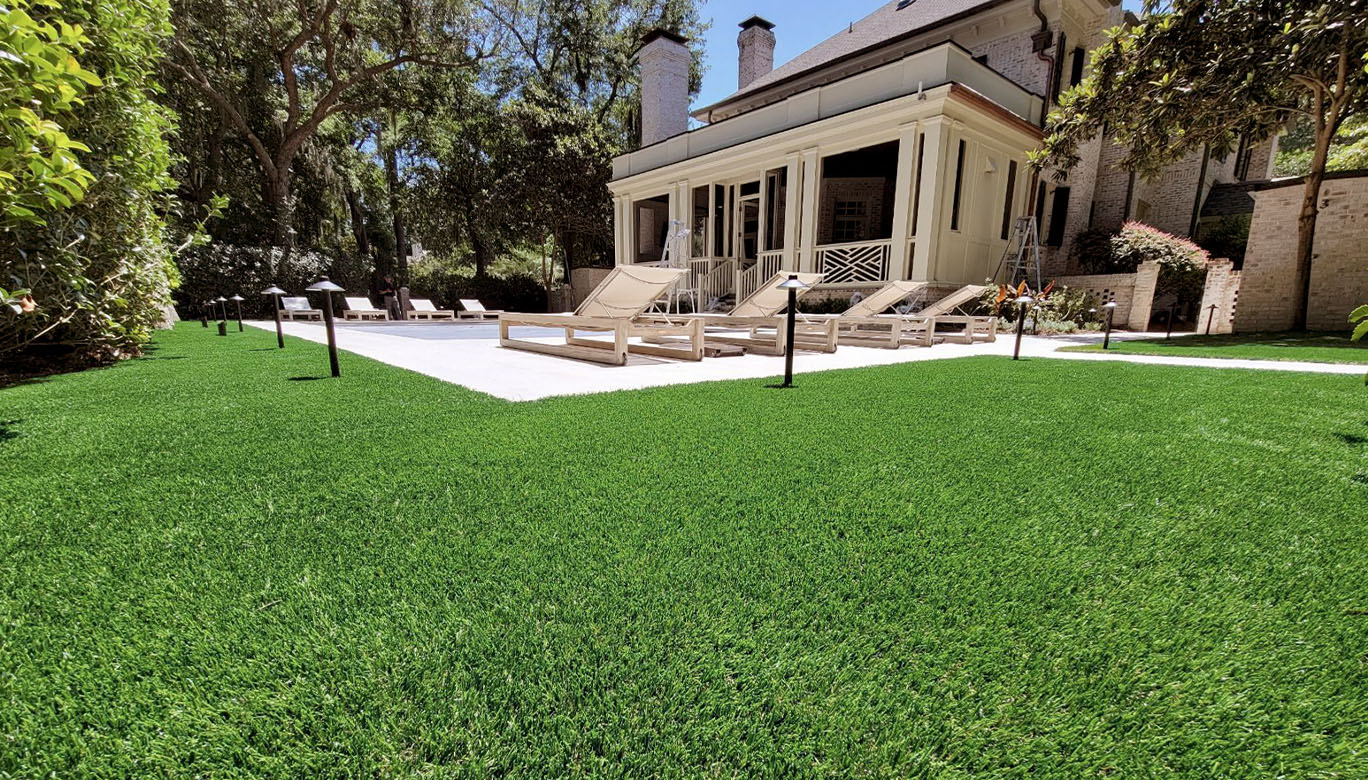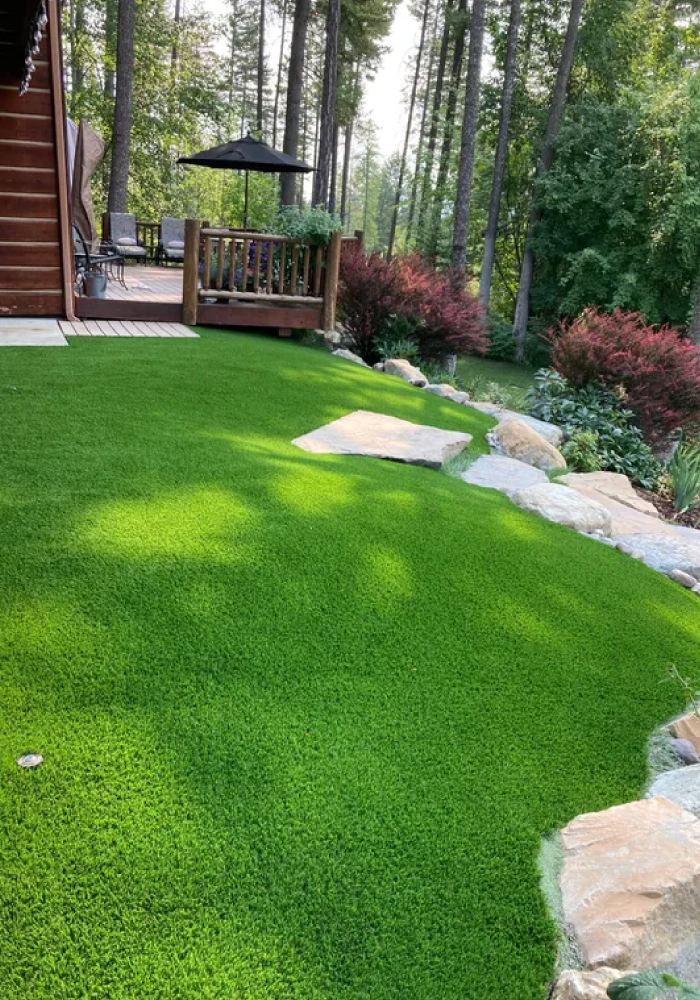Look Into the Environmental Benefits of Opting for Artificial Grass Solutions
The adoption of synthetic grass options provides an engaging possibility to attend to pressing ecological difficulties. By substantially decreasing water usage and minimizing the application of hazardous chemicals, these alternatives not just promote sustainable landscape design yet additionally shield local ecological communities. Additionally, the lower carbon impact related to reduced upkeep activities contributes to a more lasting method to land management. The effects of these benefits prolong past plain conservation initiatives, elevating inquiries concerning their long-term influence on habitat preservation and total eco-friendly balance. Exploring these measurements exposes an intricate interplay worth thinking about.
Water Conservation Perks
Among the most substantial advantages of synthetic grass is its capability to conserve water. Traditional turf lawns require considerable watering, especially in areas susceptible to drought or water restrictions. In comparison, synthetic grass does not require watering, significantly reducing the overall demand for water sources. This attribute is specifically helpful in deserts where water shortage is a pushing issue.
By getting rid of the requirement for routine watering, artificial grass adds to sustainable landscape methods and assists minimize the ecological effect of extreme water consumption. In addition, the conservation of water encompasses the decrease of drainage, which can cause soil disintegration and river contamination.
In addition, the setup of synthetic grass permits districts and house owners to assign water resources much more efficiently, concentrating on crucial usages such as drinking water and agriculture. The shift towards synthetic grass not only advertises accountable water use but additionally aligns with broader environmental goals intended at maintaining natural deposits.
As communities increasingly prioritize sustainability, the water preservation advantages of synthetic grass provide a compelling case for its adoption in domestic and business landscape design projects.
Reduced Chemical Usage
The transition to fabricated turf substantially lowers the reliance on chemical treatments commonly made use of in natural yard upkeep. Standard turf monitoring generally involves the application of herbicides, plant foods, and pesticides to advertise development and control insects. These chemicals can position dangers to human health, local wildlife, and the environment, adding to dirt and water contamination.
On the other hand, man-made turf gets rid of the need for these unsafe materials. Once set up, it needs marginal upkeep, mostly consisting of normal cleansing and irregular infill replenishment. This decrease in chemical use not just benefits the immediate atmosphere yet likewise contributes to broader ecological security. By lessening the release of synthetic compounds right into the environment, synthetic turf advertises healthier soil and water supply.
Additionally, the lack of chemical drainage connected with synthetic grass setups aids shield neighborhood waterways from air pollution, sustaining marine life and preserving biodiversity. Arizona artificial turf. As areas increasingly prioritize sustainable methods, going with synthetic grass provides a practical remedy that straightens with environmental conservation goals. Via this change, homeowner can take pleasure in lush eco-friendly rooms without endangering environmental health and wellness, leading the way for a more sustainable future
Lower Carbon Footprint

Furthermore, the setup of fabricated grass can lead to considerable water preservation. All-natural lawns require considerable amounts of water for irrigation, which not just includes to the carbon footprint connected with water extraction and treatment yet additionally strains local water resources. In contrast, synthetic grass needs marginal upkeep, requiring no watering, consequently significantly decreasing water use and its linked power prices.
Furthermore, the durability of synthetic grass adds to its decreased carbon effect. With a life expectancy of up to 15 years or even more, the need for regular replacements is diminished, causing less waste and reduced energy intake in manufacturing and dealing with typical turf alternatives. On the whole, synthetic grass offers a sustainable choice for ecologically mindful landscaping.
Environment Preservation
Environment conservation is a vital factor to consider in the dispute over landscaping selections, particularly when comparing artificial turf to all-natural turf. All-natural grass yards often her comment is here need comprehensive upkeep, including the usage of herbicides, plant foods, and pesticides, which can negatively impact regional ecosystems. These chemicals can seep right into the dirt and rivers, damaging indigenous plants and fauna and interfering with neighborhood habitats.
Synthetic grass eliminates the requirement for unsafe chemicals, thereby safeguarding nearby wildlife and maintaining the integrity of bordering ecosystems. The installment of man-made lawn can lead to the conversion of previous grass locations right into even more biodiverse landscapes, such as pollinator gardens or native plant locations, which can sustain neighborhood wild animals.
Inevitably, the change to synthetic grass not just preserves water and lowers upkeep initiatives yet additionally promotes a more harmonious relationship between human tasks and the native environment, promoting environment conservation at the same time.
Long-Term Sustainability
Lasting sustainability is an essential factor in examining the advantages of synthetic grass over typical lawn lawns. One of the most substantial benefits of artificial turf is its toughness; it can last as much as 15-20 years with minimal upkeep, whereas natural yard calls for regular reseeding and replacement. This long life decreases the need for consistent resources, such as water, fertilizers, and pesticides, which are important for keeping a healthy grass yard.
Additionally, synthetic grass contributes to a decrease in carbon discharges related to yard treatment devices. Traditional grass typically call for gas-powered mowers, leaners, and blowers, all of which add to air pollution. Turf installation phoenix az. On the other hand, artificial grass eliminates the requirement for such tools, promoting a cleaner atmosphere
In addition, the manufacturing of synthetic grass significantly utilizes recycled products, boosting its sustainability profile. As makers take on green practices, the ecological impact of synthetic grass remains to diminish.

Conclusion
The fostering of synthetic grass solutions provides significant ecological advantages, consisting of considerable water conservation, minimized dependence on harmful chemicals, and a reduced carbon impact. Artificial grass aids in protecting natural environments by reducing land disruption and promoting lasting sustainability via the usage of resilient products. Jointly, these elements emphasize the capacity of synthetic grass next to add favorably to environmental health and wellness and provide a sensible alternative to standard landscape design practices in a progressively resource-conscious globe.
In contrast, man-made lawn does not need watering, substantially reducing the general need for water resources. By reducing the release of artificial compounds into the ecosystem, artificial grass advertises much healthier soil and water systems.
In addition, the setup of my blog synthetic grass can result in considerable water preservation. In contrast, artificial turf needs very little maintenance, requiring no watering, thus substantially minimizing water use and its linked power prices.
